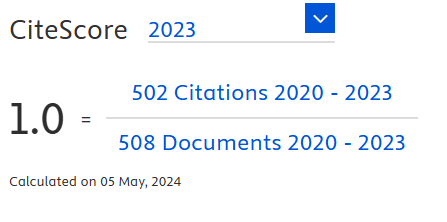The phytochemical screening and antioxidant potential of the hydroethanolic extract of Chenopodium album L.
DOI:
https://doi.org/10.18006/2025.13(2).182.189Keywords:
Chenopodium album, Antioxidant activity, GC-MS fingerprint, AAS analysisAbstract
This study aimed to evaluate the phytochemical composition, mineral content, and antioxidant potential of the hydroethanolic extract of Chenopodium album (CAHE). The mineral content was analyzed using atomic absorption spectroscopy (AAS) with samples prepared by acid digestion. Phytochemical profiling was conducted using Gas Chromatography and Mass Spectrometry (GC-MS), employing a Supelco capillary column and helium as the carrier gas (1.21 mL/min). Mass spectra (m/z 40–600) were analyzed by matching with the NIST library. Bioactive compounds were identified based on the relative peak area and spectral comparisons. Antioxidant activity was evaluated through nitric oxide scavenging, DPPH radical scavenging, reducing power, and metal chelation assays, using ascorbic acid and butylated hydroxytoluene (BHT) as standards. AAS analysis revealed high concentrations of calcium, magnesium, iron, zinc, phosphorus, sodium, and potassium, indicating the nutritional value of CAHE. GC-MS fingerprinting identified bioactive compounds such as linoleic acid ethyl ester, quercetin, and phytol, known for their antioxidant, immunomodulatory, and anti-inflammatory properties. Furthermore, antioxidant assays demonstrated strong free radical scavenging activity. CAHE exhibited significant nitric oxide and DPPH radical scavenging activities compared to ascorbic acid and BHT, respectively, along with moderate metal chelating activity. These results highlight the potential of CAHE in combating diseases related to oxidative stress. The study confirms that C. album contains essential minerals and bioactive phytochemicals with potent antioxidant properties. Its capacity for free radical neutralization underscores its applicability in therapeutic and preventive healthcare products.
References
Aziz, A., Ishaq, U., Azhar, M.F., Yasin, G., Zubair, M., Rafiq, I., & Tiwana, U.A.(2023). Exploring the nutraceutical and medicinal potential of common weeds Chenopodium album L. and Avena as alternative food supplement and medicine. International Journal of Forest Sciences, 4(2),287-296.
Badri, A., El Ghali, S., Alvarez-Serrano, I., Hemden, K., Aloui, F., & Gassoumi, M.(2025). Chenopodium exsuccum plant extract for green zinc oxide nanoparticles synthesis: Photocatalytic titan yellow degradation and antioxidant and antibacterial properties. Inorganic Chemistry Communications, 172(2),724-735. DOI: https://doi.org/10.1016/j.inoche.2024.113724
Baliyan, S., Mukherjee, R., Priyadarshini, A., Vibhuti, A., Gupta, A., Pandey, R.P., & Chang, C. M. (2022). Determination of antioxidants by DPPH radical scavenging activity and quantitative phytochemical analysis of Ficus religiosa. Molecules, 27(4), 13-26. DOI: https://doi.org/10.3390/molecules27041326
Bhargava, A., Shukla, S., & Ohri, D. (2010). Mineral composition in foliage of some cultivated and wild species of Chenopodium. Spanish Journal of Agricultural Research, 8(2), 371-376. DOI: https://doi.org/10.5424/sjar/2010082-1197
Chamkhi, I., Charfi, S., El Hachlafi, N., Mechchate, H., Guaouguaou, F.E., El Omari, N., Bakrim, S., Balahbib, A., Zengin, G., & Bouyahya, A. (2022). Genetic diversity, antimicrobial, nutritional, and phytochemical properties of Chenopodium album: A comprehensive review. Food Research International, 154(2), 110-121. DOI: https://doi.org/10.1016/j.foodres.2022.110979
Chaudhari, V.M., Singh, O.B., Gouthami, N.S., Thakur, N., Singh, R., Singh, S., Thapa, U., & Nagar, B.L. (2024). Unlocking the Nutritional Power of Vegetables: A Guide to Vibrant Health. European Journal of Nutrition & Food Safety, 16(2), 247-261. DOI: https://doi.org/10.9734/ejnfs/2024/v16i81512
Costa, M.I., Sarmento-Ribeiro, A.B., & Gonçalves, A.C. (2023). Zinc: from biological functions to therapeutic potential. International Journal of Molecular Sciences, 24(5), 48-54. DOI: https://doi.org/10.3390/ijms24054822
Dakhane, S.C.V. (2024). Wild vegetables (Chenopodium album L): Ethno pharmacology, phytochemical and nutrient profile. Journal of Pharmacognosy and Phytochemistry, 13(3), 367-376. DOI: https://doi.org/10.22271/phyto.2024.v13.i3e.14975
Dolma, N., Shahar, B., & Chongtham, N. (2024). Determination of mineral elements, antioxidant activity and bio-active compounds of allium prezewalskianum regel, an underutilized plant of Ladakh, India using ICP-AES, AAS and GC-MS. Measurement: Food, 13(10), 100-115. DOI: https://doi.org/10.1016/j.meafoo.2024.100144
El-Lateef, H.M.A., El-Dabea, T., Khalaf, M.M., & Abu-Dief, A.M. (2023). Recent overview of potent antioxidant activity of coordination compounds. Antioxidants, 12(2), 213-220. DOI: https://doi.org/10.3390/antiox12020213
Fatima, G., Dzupina, A., Alhmadi, H.B., Magomedova, A., Siddiqui, Z., Mehdi, A., Hadi, N., & MEHDI, A. (2024). Magnesium matters: A comprehensive review of its vital role in health and diseases. Cureus, 16(10), 71-78. DOI: https://doi.org/10.7759/cureus.71392
Handa, S.S., Khanuja, P.S., Longo, G., & Rakesh, D.D. (2008).Extraction Technologies for Medicinal and Aromatic Plants. International center for science and high technology, 24(2), 70-72.
Imran, M., Iqbal, A., Badshah, S.L., Ahmad, I., Shami, A., Ali, B., Alatawi, F.S., Alatawi, M.S., Mostafa, Y.S., Alamri, S.A., & Alalwiat, A.A. (2023). Exploring the hidden treasures of Nitella hyalina: A comprehensive study on its biological compounds, nutritional profile, and unveiling its antimicrobial, antioxidative, and hypoglycemic properties. World Journal of Microbiology and Biotechnology, 39(12), 345-358. DOI: https://doi.org/10.1007/s11274-023-03795-x
Iqbal, T., Altaf, S., Fatima, M., Rasheed, R., Laraib, K., Azam, M., Karamat, M., Salma, U., & Usman, S. (2024). A narrative review on effective use of medicinal plants for the treatment of parasitic foodborne diseases. Agrobiological Records,16(4), 79-92. DOI: https://doi.org/10.47278/journal.abr/2024.016
Jomova, K., Alomar, S.Y., Alwasel, S.H., Nepovimova, E., Kuca, K., & Valko, M. (2024). Several lines of antioxidant defense against oxidative stress: Antioxidant enzymes, nanomaterials with multiple enzyme-mimicking activities, and low-molecular-weight antioxidants. Archives of Toxicology, 98(5), 1323-1367. DOI: https://doi.org/10.1007/s00204-024-03696-4
Karaçelik, A.A., & Şahin, H. (2021). Determination of chemical compositions, antioxidants, and enzyme inhibitory activities of naturally growing Chenopodium album subsp. IranicumAellen. Journal of the Institute of Science and Technology, 11(3), 2091-2101. DOI: https://doi.org/10.21597/jist.825781
Kumar, A.P.N., Kumar, M., Jose, A., Tomer, V., Oz, E., Proestos, C., Zeng, M., Elobeid, T.K.S., & Oz, F. (2023). Major phytochemicals: recent advances in health benefits and extraction method. Molecules, 28(2),887-891. DOI: https://doi.org/10.3390/molecules28020887
Leyane, T.S., Jere, S.W., & Houreld, N.N. (2022). Oxidative stress in ageing and chronic degenerative pathologies: molecular mechanisms involved in counteracting oxidative stress and chronic inflammation. International journal of molecular sciences, 23(13), 7273. DOI: https://doi.org/10.3390/ijms23137273
Liu, N., Wang, Y., An, X., Qi, J., Wang, B., Du, J., & Wang, W. (2024). Composition, antioxidant and development-promoting activity of fermentation modified crude polysaccharides from stem and leaves of Chenopodium album L. Chemical and Biological Technologies in Agriculture, 11(1), 88-97. DOI: https://doi.org/10.1186/s40538-024-00610-z
Lone, B.A., Chishti, M.Z., Bhat, F.A., Tak, H., Bandh, S.A., & Khan, A. (2017). Evaluation of anthelmintic antimicrobial and antioxidant activity of Chenopodium album. Tropical animal health and production, 49(2), 1597-1605. DOI: https://doi.org/10.1007/s11250-017-1364-y
Mila, K.J., Hassan, J., Hasan, M.F., Alfagham, A.T., Ali, L., et al. (2024). Nutritional composition, bioactive compounds and antioxidant potentiality of some indigenous vegetables consumed in Bangladesh. Scientific Reports, 14(1),27699-27712. DOI: https://doi.org/10.1038/s41598-024-78625-7
MirsoleimaniAzizi, S.M., Zakaria, B.S., Haffiez, N., & Dhar, B.R. (2023). Sludge thermal hydrolysis for mitigating oxidative stress of polystyrene nanoplastics in anaerobic digestion: Significance of the solids content. ACS Sustainable Chemistry & Engineering, 11(18), 7253-7262. DOI: https://doi.org/10.1021/acssuschemeng.3c01349
Naik, R.R., Tan, S., & Selomulya, C. (2024). Beyond Calcium: Current Trends of Supplementation for Bone Health. Food Reviews International, 20(4),1-25. DOI: https://doi.org/10.1080/87559129.2024.2440482
Pan, S. P., Pirker, T., Kunert, O., Kretschmer, N., Hummelbrunner, S., et al. (2019).C13 megastigmane derivatives from Epipremnum pinnatum: β-damascenone inhibits the expression of pro-inflammatory cytokines and leukocyte adhesion molecules as well as NF-κB signaling. Frontiers in Pharmacology, 10(2), 1351-1363. DOI: https://doi.org/10.3389/fphar.2019.01351
Pop, M.S., Cheregi, D.C., Onose, G., Munteanu, C., Popescu, C., et al. (2023). Exploring the potential benefits of natural calcium-rich mineral waters for health and wellness: A systematic review. Nutrients, 15(14),26-31. DOI: https://doi.org/10.3390/nu15143126
Qi, W., Qi, W., Xiong, D., & Long, M. (2022). Quercetin: Its antioxidant mechanism, antibacterial properties and potential application in prevention and control of toxipathy. Molecules, 27(19), 65- 71. DOI: https://doi.org/10.3390/molecules27196545
Rahman, M.M., Ghosh, P.K., Akter, M., Al Noor, M.M., Rahman, M.A., et al. (2024). Green vanguards: Harnessing the power of plant antioxidants, signal catalysts, and genetic engineering to combat reactive oxygen species under multiple abiotic stresses. Plant Stress, 11(2): 230-239. DOI: https://doi.org/10.1016/j.stress.2024.100547
Ruth, O.N., Unathi, K., Nomali, N., & Chinsamy, M. (2021). Underutilization versus nutritional-nutraceutical potential of the Amaranthus food plant: a mini-review. Applied Sciences, 11(15), 68-77. DOI: https://doi.org/10.3390/app11156879
Sameen, A., Salman, M., Ali, S., & Nasreen, S.T. (2025). Su’al-Qinya: Unani Perspective on Iron Deficiency Anemia, its Pathogenesis, and Therapeutic Interventions. Journal of Drug Delivery & Therapeutics, 15(1), 40-48. DOI: https://doi.org/10.22270/jddt.v15i1.6966
Sarkar, T., Salauddin, M., Roy, S., Chakraborty, R., Rebezov, M., Shariati, M.A., Thiruvengadam, M., & Rengasamy, K.R.R. (2023). Underutilized green leafy vegetables: frontier in fortified food development and nutrition. Critical Reviews in Food Science and Nutrition,63(33), 11679-11733. DOI: https://doi.org/10.1080/10408398.2022.2095555
Shahar, B., Dolma, N., & Chongtham, N. (2023). Phytochemical analysis, antioxidant activity and identification of bioactive constituents from three wild medicinally important underutilized plants of Ladakh, India using GCMS and FTIR based metabolomics approach. Food and Humanity, 1(4), 430-439. DOI: https://doi.org/10.1016/j.foohum.2023.06.022
Shahid, M., Singh, R.K., & Thushar, S. (2023). Proximate composition and nutritional values of selected wild plants of the United Arab Emirates. Molecules, 28(3),1504-1513. DOI: https://doi.org/10.3390/molecules28031504
Singh, S., Singh, A., Hallan, S.S., Brangule, A., Kumar, B., & Bhatia, R. (2023). A compiled update on nutrition, phytochemicals, processing effects, analytical testing and health effects of Chenopodium album: A non-conventional edible plant (NCEP). Molecules, 28(13), 49-55. DOI: https://doi.org/10.3390/molecules28134902
Szabo, R., Budai, P., Juhász, É., Major, L., & Lehel, J. (2024). Potential Teratogenicity Effects of Metals on Avian Embryos. International Journal of Molecular Sciences, 25(19), 10662-10672. DOI: https://doi.org/10.3390/ijms251910662
Talucder, M.S.A., Ruba, U.B., & Robi, M.A.S. (2024). Potentiality of Neglected and Underutilized Species (NUS) as a future resilient food: A systematic review. Journal of Agriculture and Food Research, 16(3), 1-20. DOI: https://doi.org/10.1016/j.jafr.2024.101116
Tumilaar, S. G., Hardianto, A., Dohi, H., & Kurnia, D. (2024). A comprehensive review of free radicals, oxidative stress, and antioxidants: Overview, clinical applications, global perspectives, future directions, and mechanisms of antioxidant activity of flavonoid compounds. Journal of Chemistry, 2024(1),1-21. DOI: https://doi.org/10.1155/2024/5594386
Ujan, J.A., Rind, K.H., Kesbiç, O.S., Masud, S., Habib, S.S., Al-Rejaie, S.S., Mohany, M., & Fazio, F. (2025). Green Boost for Nile Tilapia, Oreochromis niloticus: Unveiling the Multifaceted Effects of Chenopodium album Leaves Powder on Growth, Hematology, Antioxidant Defense, Nonspecific Immunity and Tolerance against Aeromonas hydrophila. Aquaculture Research, 2025(1), 9050-9063. DOI: https://doi.org/10.1155/are/8919050
Wei, C., Jiao, Q., Agathokleous, E., Liu, H., Li, G., Zhang, J., Fahad, S.,& Jiang, Y. (2022). Hormetic effects of zinc on growth and antioxidant defense system of wheat plants. Science of the Total Environment, 807(12), 150-162. DOI: https://doi.org/10.1016/j.scitotenv.2021.150992
Zhang, F., Zhang, G., Wang, C., Xu, H., Che, K., Sun, T., Yao, Q., Xiong, Y., Zhou, N., Chen, M., & Yu, H. (2025). Geographical variation in metabolite profiles and bioactivity of Thesiumchinenseturcz. revealed by UPLC-Q-TOF-MS-based metabolomics. Frontiers in Plant Science, 15(2),147-159. DOI: https://doi.org/10.3389/fpls.2024.1471729
Downloads
Published
How to Cite
License
Copyright (c) 2025 Journal of Experimental Biology and Agricultural Sciences

This work is licensed under a Creative Commons Attribution-NonCommercial 4.0 International License.












